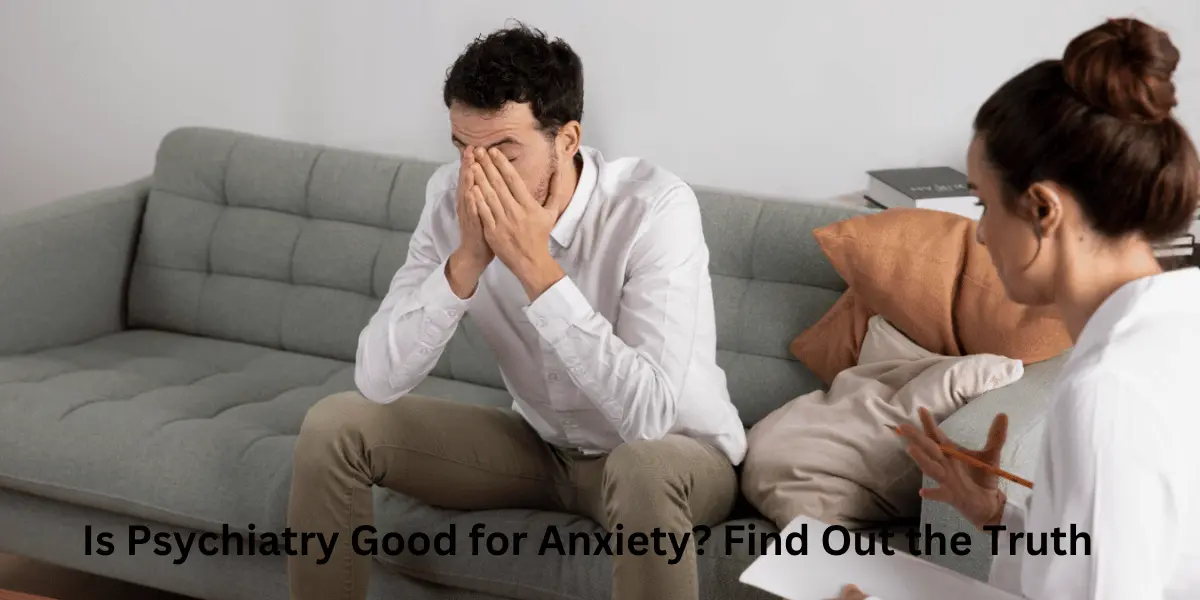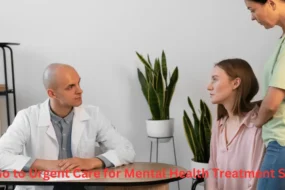- Home
- Mind Health
- Is Psychiatry Good for Anxiety ...

Anxiety is a common disorder that affects millions of people worldwide, but thankfully, psychiatric treatments offer helpful options. Through a combination of medication, psychotherapy, and lifestyle changes, psychiatry provides valuable support for managing this condition.
Choosing the right provider, whether a psychiatrist or psychologist, depends on their training, specialization, and approach. A thorough initial evaluation, involving questions about your mental health, helps determine the best course of treatment. With the right care, patients can explore effective ways to navigate anxiety and regain control over their lives.
Is Psychiatry Good for Anxiety?
Yes, psychiatry is effective for anxiety, offering personalized treatment through medication, therapy, and lifestyle changes to manage symptoms and improve overall well-being. It addresses both the root causes and emotional challenges, providing long-term relief.
What is Anxiety?
Anxiety is a mental health disorder that causes excessive worry about everyday situations and challenges. While it is a natural response to stress or danger, it can become excessive and affect a person’s quality of life when the symptoms last for more than six months.
People may experience restlessness, a constant feeling on edge, or muscle tension, sometimes accompanied by trembling.
Difficulty in sleeping or concentrating, avoiding certain social triggers, and even having frequent panic attacks are common signs. Recognizing these symptoms is key to understanding when anxiety needs professional support.
What do Psychiatrists do For Anxiety?
A psychiatrist is not just someone who prescribes medication, though that is a part of their role. As a licensed professional with a medical degree, a psychiatrist can provide a wide range of treatment options for anxiety.
Medication
These may include medications that help manage symptoms, but psychiatrists also offer therapies to address the root causes of anxiety. They assess your specific situation and create a treatment plan that could involve lifestyle changes, counseling, or a combination of methods.
While quick solutions like medication may provide temporary relief, the goal is always to find long-term benefits and help you manage your anxiety in a sustainable way.
Psychoeducation
Psychiatrists play a crucial role in managing anxiety by offering psychoeducation that focuses on understanding its subtypes, such as generalized anxiety or panic disorders, and the factors contributing to their onset and symptom expression.
They help patients adopt adaptive behaviors and healthier habits to address anxiety, emphasizing the importance of self-care to improve overall well-being. If you’ve ever think, “Can I Go To Urgent Care for Mental Health Treatment?”, the answer may depend on the sensitivity of your situation, but proactive behaviors like forming a consistent sleep routine, practicing meditation, and enhancing diet and nutrition are fundamental steps in managing anxiety.
These strategies not only help reduce anxiety symptoms but also empower patients to face daily challenges with full confidence.
Therapy
When seeking help for anxiety, understanding the role of psychiatrists is crucial. While they are often highly trained in assessing and diagnosing mental health conditions, their therapy training during medical programs may be minimal.
Some psychiatrists, however, pursue post-graduate studies through institutes or continuing education programs, becoming recognized experts in therapeutic action. It’s essential for a prospective patient to ask about the approach, structure, length, and frequency of sessions when considering therapy with a psychiatrist.
Alternatively, you can seek help from another mental health professional, which is perfectly acceptable. While many patients rely on medication management, therapy provides the depth and understanding needed to truly guide personal growth and address anxiety effectively.
When to see a Psychologist for Anxiety
Psychologists are highly licensed mental health professionals with advanced doctoral degrees like PhD or PsyD, obtained through clinical psychology or counseling psychology programs. These programs require rigorous training and typically take about five years to complete, ensuring solid clinical preparation that adheres to ongoing national standards for accreditation.
Unlike psychiatrists, whose education is broader, psychologists focus on specialized therapeutic approaches and interventions.
They excel in various modalities like individual therapy and couples therapy. Compared to licensed clinical social workers (LCSWs) or licensed professional counselors (LPCs), who undergo only two years of training, psychologists have more in-depth expertise.
However, finding the right match depends on factors like quality, talent, and whether the psychologist is a good fit for your needs. Asking questions and getting a feel for their style can help determine if the fit is right for you.
Benefits of Seeing a Psychiatrist for Anxiety Disorders
A Psychiatrist Can Help You Identify Your Triggers
Psychiatrists help uncover anxiety triggers like stressful life events such as divorce, death of any loved one, or job loss. They also address hidden causes like financial problems, traumatic experiences from abuse, car accidents, or natural disasters. Physical health issues like thyroid problems, heart disease, or diabetes can worsen anxiety, as can substance abuse, alcohol or drug dependencies, and withdrawal.
From my experience, working with a psychiatrist can feel like untangling a knot, where each session reveals connections to past traumas or unresolved stress. They guide you toward managing or avoiding triggers in a healthy way, helping you feel more in control of life’s challenges.
Determine the Root Cause of Your Anxiety
Psychiatrists are skilled at finding the root causes of anxiety, whether they stem from stressful life events like divorce, the death of a loved one, or job loss.
These triggers can also include financial problems, traumatic experiences such as abuse, car accidents, or natural disasters, as well as underlying medical conditions like thyroid problems, heart disease, diabetes, or respiratory disorders. Substance abuse, including alcohol or drug dependencies, and even withdrawal, may add to the emotional weight.
A psychiatrist helps you explore these factors and manage anxiety symptoms in a healthy way, reducing emotional strain. From my personal experience, understanding the distress behind stress and unresolved traumas can be life-changing, allowing you to navigate life’s challenges with greater ease.
Improve Your Relationships with Others
Seeking help for mental health disorders like anxiety can greatly improve your relationships. Through therapy, you can develop skills to better communicate, manage conflict in a healthy way, and learn to set boundaries.
These tools are essential for building and maintaining both personal relationships and professional relationships. Having an anxiety condition can make it challenging to connect with others, but with the right treatment, you can find methods that work for you. From my experience, clients often discover that as they improve their ability to handle emotions, their bonds with those around them naturally strengthen.
FAQ’s
Q: Can a Psychiatrist Cure Anxiety?
A psychiatrist, being a medical doctor, can help you with anxiety by diagnosing and treating mental health conditions. Along with a specialists like a psychologist or other mental health professionals, they provide counseling and psychotherapy to manage or reduce anxiety symptoms.
Q: How do I Finally Beat Anxiety?
To manage and overcome anxiety, try relaxation techniques like dropping your shoulders and breathing deeply. Imagine yourself in a relaxing place, or explore complementary therapies such as yoga, massage, t’ai chi, or mindfulness techniques like meditation. These practices can ease both the mental feelings and physical feelings of fear.
Q: How do I Permanently Stop Anxiety?
Understand your triggers by learning about anxiety, practice relaxation techniques, and use correct breathing to stay calm. Incorporate mindfulness, seek counselling, and make dietary adjustments for lasting relief.
Conclusion
In conclusion, anxiety is a complex yet manageable condition, and psychiatry offers a multifaceted approach to help individuals regain control over their lives. By combining medication, psychotherapy, and lifestyle changes, psychiatrists address both the symptoms and root causes of anxiety, enabling long-term relief.
Whether working with a psychiatrist, psychologist, or other mental health professionals, the right support empowers individuals to navigate challenges, improve relationships, and build healthier habits. With personalized care and commitment, overcoming anxiety becomes an achievable goal, leading to a more balanced and fulfilling life.





